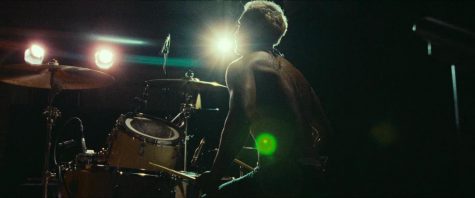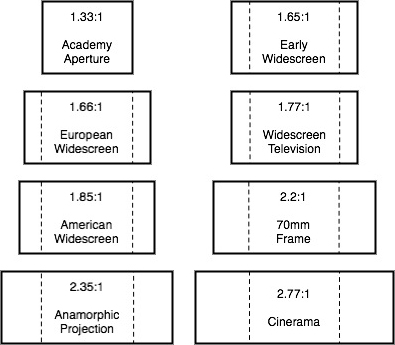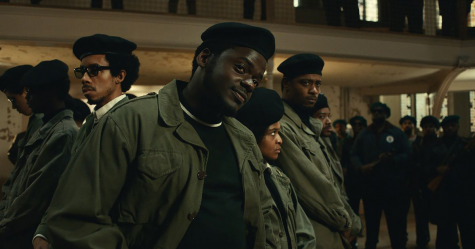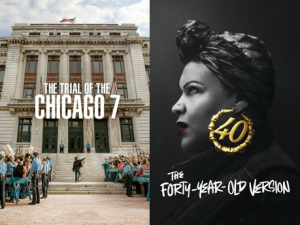Let’s talk about the Oscars: 2021 Edition
Does anyone even take the Oscars seriously anymore?
The Oscars are an annual film award show which awards films in various categories. Films are chosen for awards by a group of industry professionals, and winners will often have their careers changed for the better.
April 21, 2021
It’s that time of year, where a bunch of old, decrepit Hollywood executives come together and decide what the best movies of the year are. I think everyone at this point knows that the Oscars are a sham. Despite their inspired choice of Parasite last year for Best Picture, we can’t forget that most of the Academy’s decisions for the award are, well, not that. And that’s not to even mention that every year, the Academy snubs countless great films because nominations rely almost solely on studios launching expensive “for your consideration” campaigns. But alas, the Oscars are still important to the cultural zeitgeist, and whoever wins Best Picture this year will certainly have their career boosted because of it. So, let’s go over the nominees in order of release date!
“Sound of Metal” (2019)

I think that “Sound of Metal”, despite being from 2019, has a pretty good chance of winning the Oscars this year. It’s a loose, raw tale about disability and strife and a pretty astonishing character piece to boot. The film follows Riz Ahmed as Ruben Stone, an exceptionally talented metal drummer who, during one of his performances, inexplicably loses his hearing. After that, the drama unfolds into a much different story than you might expect from the premise. While music is obviously important to the main character, what the film becomes a story about substance abuse, relationships, and learning to accept that your disabilities don’t make you a lesser person.
While the script is certainly effective at driving the film along, though I think it’s a tad too long, what really makes the movie work are the performances and sensory experience. Riz Ahmed is excellent, and is firing on all cylinders. He breathes a manic energy into Ruben’s character which, while obvious in more energetic scenes, is almost more effective in the scenes where he’s clearly holding back certain anxieties and insecurities in normal conversation. I was also taken aback by the unique sound design, which is probably the most striking stylistic element in the film. In a move which I think is essential for a story like this, much of the sound that we hear is not what would be heard by someone with good hearing, but rather an approximation of what Ruben is hearing. While this is certainly the most interesting bit of presentation in the film, especially near the end for reasons I won’t reveal, I mostly just wish that the film committed to that aural style more. I think that a film told entirely from Ruben’s aural perspective would’ve significantly elevated the film to greatness. But even with that qualm, I’d still highly recommend this one, and have hopes for its chances at the Oscars.
“Promising Young Woman” (2020)

“Promising Young Woman” is a peculiar specimen. While it’s certainly more tasteful than most other rape revenge films, and certainly more hip to modern criticisms of the genre, it’s still kind of baffling to me that it’s been nominated for Best Picture. Not to say it’s bad, I’d argue it’s pretty good, but I can’t deny that it left a bit of a bad taste in my mouth. The film follows Cassie, a woman in her mid-twenties who, scarred by the horrible assault of her friend—which ultimately caused the friend to commit suicide—now lives at home with her parents. Each night, she goes to bars pretending to be too drunk to function, and each night, she gets taken home by a man masquerading as someone with good intentions. When the men try to take advantage of what they believe is a severely inebriated woman, Cassie makes them glad she didn’t bring scissors. The film really picks up when Cassie finds someone she knows from medical school before she dropped out, and seeks to exact vengeance on those who wronged her friend.

There are things that I really appreciate about this one. I like that the film deviates from many of the other films in its genre by not having Cassie be a violent murderer, and there are a couple of brilliant scenes which stem from that subversion. But then again, there’s that bad taste in my mouth. Starting with the visuals, I think that this film’s aspect ratio (2.39:1) is far too wide. Now, while I think the film uses the aspect ratio to its advantage at times, utilizing the negative space to create some evocative and unsettling images, that’s not how most scenes play out. Most of the frames are just impractically wide, and the most interesting shots in the movie are generally unintentionally hilarious uses of biblical imagery. But while the framing leaves something to be desired, the movie mostly bothers me on a thematic level. While I admire Emerald Fennell’s more subversive and—dare I say it—feminist approach to the rape revenge genre, I still think it’s kind of distasteful to not ever give the victim of the story a voice. The whole draw of the genre is to give those who have been victimized a voice and an outlet to fight back, which makes this sort of weak, candy-coated approach really unsatisfying. And this is all disregarding the ending, which, while I will avoid discussing for fear of spoilers, only serves to exacerbate my point. “Promising Young Woman” isn’t even close to being the worst movie nominated this year, but I’d be surprised if it won.
“Minari” (2020)

It looks like “Minari” has got some of the most critic and audience buzz this year, and for good reason. It’s an exceptionally heartfelt ode to Asian American immigrants in America, and possibly the most thoroughly American movie in recent memory (despite what the Golden Globes may want you to believe). “Minari” follows a Korean American family as they settle into a rural town in Arkansas, where the father, Jacob, intends to establish a farm. While in theory Jacob’s story is the focal point of the film—it’s certainly the most prototypically American—the movie is just as much about the rest of the Yi family as it is about him. It’s about the youngest of the family, David, whose weak heart prevents him from engaging in many of the physical activities he wants to participate in and whose friends convince him that abandoning his culture is superior to embracing it. It’s about Soonja, his grandmother, who moves in with the family and challenges his notions of what a proper grandmother is through her swearing, gambling, and obsession with professional wrestling. I could continue like this with the rest of the family, but you get the point.
While I could certainly gush about the dreamy cinematography and the perfect score, I’d like to give some love to the performances, because considering the Academy’s relationship with Asian American performers, they won’t. While Steven Yeun’s performance as Jacob is certainly roguishly charming, and while Youn Yuh-jung’s performance as Soonja is terrific and bittersweet, I’d like to give some love to Han Yeri as Monica, the family’s mother. Her role in the story is more reserved than the rest, acting as a sort of glue for the family. It’s undeniable that she’s not nearly as appreciated by the rest of the family as she deserves to be, and the way that she handles it is tender and subtly heartbreaking at times. That’s not to say that she always remains level headed, but Yeri’s performance in the more subtle moments of the film really elevates it for me. “Minari” is definitely one of the most promising contenders at the Oscars this year, and it’s definitely one of my favorites.
“The Father” (2020)

“The Father” addresses a topic very personal to me; not because I know someone who has dementia, but just because getting it is my greatest fear. With that out of the way, I can confidently say that “The Father” approaches greatness! Dare I say it—it might even drag its finger across greatness on occasion. “The Father” centers around Anthony (played by Anthony Hopkins), an elderly man with dementia, as he steadily loses his grip on the world around him. This one’s probably the most emotionally devastating of this year’s nominees, with small moments and scenes that come back to haunt you later and some truly heart-wrenching performances. While being a story about dementia first and foremost, I think the film very intelligently manages to be a more universal story about the fear of abandonment and the struggles of old age.
While the film is quite poignant emotionally, there was something holding me back from enjoying it more—mostly the presentation. While I can’t deny that the film is occasionally quite pretty, its roots in theater are made shockingly obvious. Florian Zeller clearly doesn’t have expertise in the cinematic arts, made most obvious by the choice of a startlingly wide aspect ratio of 2.39:1 (I’m starting to notice a trend). Perhaps Zeller thought that would make his vision more cinematic, but it only serves to depersonalize what is an incredibly human drama, which needs a slightly thinner aspect ratio. I’m not even asking for the film to be presented in 1.33:1, but 1.77:1 would suffice, and I think a ratio of 1.66:1 like that used in 2019’s “Marriage Story” would’ve been perfect. But with all of that aside, I still think “The Father” is quite good, purely because of its emotional resonance. I wouldn’t be terribly surprised to see it win Best Picture.
“Nomadland” (2020)

“Nomadland” is probably the most enigmatic of the nominees this year, and I’m pleasantly surprised that it was nominated. The film follows the brilliant Frances McDormand as Fern, a woman forced to be a modern nomad by the Great Recession. Her wandering about the American West between jobs, people, and homes is a deeply meditative look at the ways certain people find happiness in instability. Fern seems to be a woman who, whether it be by nature or circumstance, is predisposed to fear complacency. Whenever stability presents itself to her, whether it be in the form of a steady job or a potential romantic partner, she can’t let herself accept it. In a different – and debatably lesser – film, Fern’s inability to tether herself down would be the thing that had to change by the end of the story, but director Chloé Zhao’s approach is notably more sympathetic.
Taking clear inspiration from the films of Terrence Malick, Fern is swallowed by the landscape. Nature itself garners more characterization than many of the people who traverse it, captured in an (appropriately) wide aspect ratio. With this framing, you see the world how Fern does. Out in the wild is when Fern is at home and where she forms her closest bonds. But inside buildings, the walls are always in frame. Interiors are made uncomfortable by the presence of barriers, which suffocate Fern because she just doesn’t belong. While it’s certainly not my favorite of the nominees, I wouldn’t be surprised if it took home the win.
“The Trial of the Chicago 7” (2020)

Just about as uninspired as ever, and not very well made to boot. It’s a sort of high energy imitation of all of the good court drama and social issue movies, some of which writer and director Aaron Sorkin even had a part in making. I’d say that I’m shocked that something as lifeless and derivative as this has been nominated for Best Picture over something like “Mangrove” (2020), but that would imply that I have any respect for the Academy already. My thoughts about the film on its release were largely lukewarm, but over time, it’s frustrated me more and more that “Trial” has garnered so much more attention than many of its compatriots. It’s the worst film of the nominees, and I’d be shocked if it won.
“Mank” (2020)

The final member of the “far too wide aspect ratio club” (2.2:1), “Mank” has aged like wine. Unfortunately, this doesn’t mean that it got better with time, but rather that it went sour. While I certainly don’t dislike the film, every time I think about “Mank”, the little things annoy me more and more. What’s the point of having the main character (Mank, unsurprisingly) save a Jewish village from the Nazis off-screen? Why commit to the 1940s aesthetic without commiting to the 4:3 aspect ratio? Why aren’t there any real themes? While none of these things kill the experience of the film, most of its novelty only comes from Fincher’s admittedly fantastic production design and not much else. When considering “Mank” based on its merits alone, I’d be pretty taken aback if this one won Best Picture.
“Judas and the Black Messiah” (2021)

Simply terrific. An exercise in style, substance, and pure talent. There’s something truly mesmerizing about the way this film plays out, with every twist and turn leading to better and better scenes. Leading the charge is Daniel Kaluuya’s performance, which cements him as one of the finest talents of the 21st century. I still maintain that this film did Martin Scorsese’s “The Departed” (2006) better than Scorsese did, and that’s in no small part because each person on board with this project clearly poured their soul into this film. It’s not perfect—I can’t say I love the score, and I think there are some jarring color grading issues at select points— but there’s a point where my journalistic desire to find flaws in great films needs to take a back seat to gush. Despite not being from 2020, “Judas and the Black Messiah” is the best (or, at least, it’s my favorite) film nominated for any category this year, and if you haven’t seen it yet, go do that so you can be as excited as I will be if it sweeps.
And that’s all the nominees! But wait, I’m not done with you yet; you’ve still got to stick around for which films I think will win! I’ll keep this brief. I think “Nomadland” and “Mank” are probably the most surefire bets of the race. “Nomadland” has been sweeping awards shows, and since it’s directed by a woman, I think that the Academy might pull a “Parasite” (2019) and vote for the option which corrects some of their mistakes from previous years. If there was an easy bet to make this year, I’d say it’s “Nomadland”. Just under that, I’d put “Mank”. That’s not to say I think “Mank” deserves an Oscar, but there are a couple of factors which I think make the idea slightly more likely. For one, David Fincher has never won or even been nominated for an Oscar, despite being one of the most respected directors of the past 25 years. He directed “Zodiac” (2007), “Se7en” (1995), “Fight Club” (1999), “Gone Girl” (2014), and various other great films. What could happen here is what I like to call a “pity Oscar”: an Oscar given to a highly respected director because everyone’s been making fun of the Academy for not giving them an award for however many years. This happened in 2007’s Oscars with “The Departed”, which won Best Picture despite only being Martin Scorsese’s seventh or eighth best movie. I also think “Mank” has a chance at Best Picture since it’s about classic Hollywood, which The Academy loves.
But who knows? It’s not impossible that the Academy will just choose the best film this year! It’s not likely—their track record is poor—but I wouldn’t be against “Judas and the Black Messiah” or even “Minari” winning this year, though I don’t have much faith in a win for “Minari” because I don’t have enough good will toward the Academy to think that they’ll award a film with Koreans in it Best Picture two years in a row. It’s a pessimistic world view, sure, but The Academy rarely rewards optimism.









